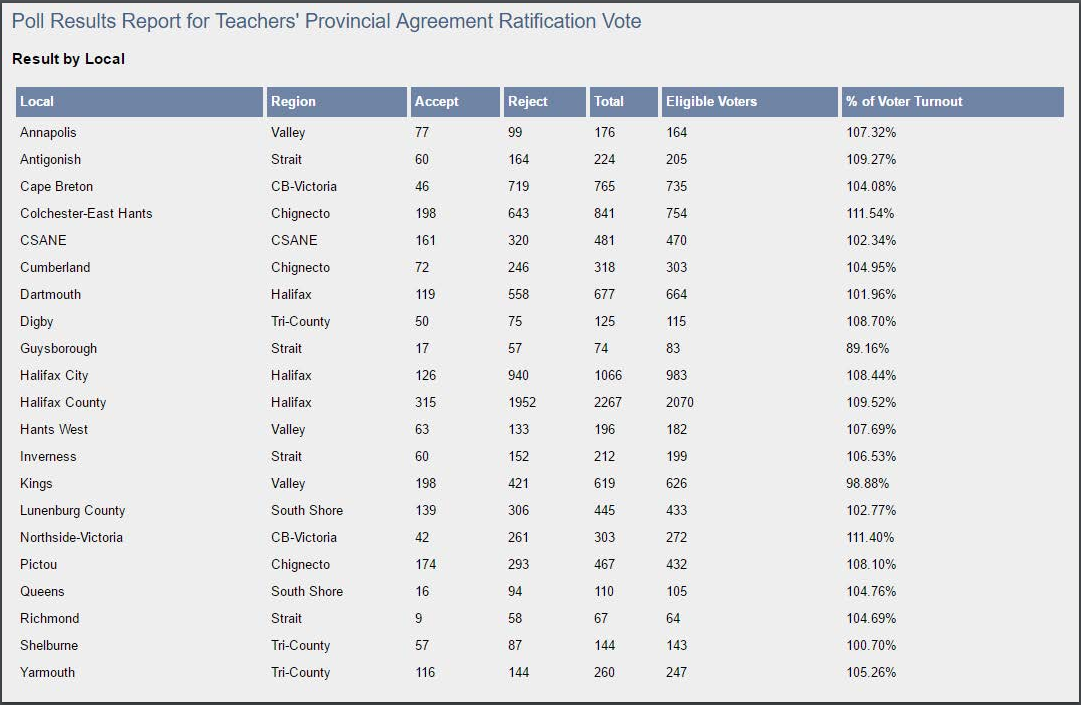Nova Scotia teachers have voted down a third tentative agreement, signalling to both the government and the union that they aren’t happy with the contracts either side has agreed upon in the past year.

READ MORE: Nova Scotia teachers vote against third tentative agreement with province
Nancie de la Chevotiere, a teacher at Halifax West High School, told Global News Friday she voted to reject the contract because “it was the right thing to do” for students, for herself and for education as a whole.
“There are no changes in working conditions, it was stripping away benefits that we had negotiated long ago to compensate for loss of wage increase, so it was unacceptable to have a contract that was so disrespectful to everyone involved in education,” she said.
The Nova Scotia Teachers Union membership voted 78.5 per cent against the latest contract, with the majority of teachers in each local across the province voting “no.” Results show more than 100 per cent of eligible members cast a vote, because substitute teachers working on the day of the vote are allowed to vote.
De la Chevotiere called the government’s offer of an extra $60 million in this third contract “meaningless,” because it wouldn’t have done enough to impact systemic issues like class size, inclusion and other classroom conditions.
She said the government promised $20 million for a committee and appointed an arbitrator, but the arbitrator would have had a limit of allocating $250,000 on each issue, which she said wouldn’t be enough to address systemic issues.
READ MORE: NS committed to classroom change with latest offer to teachers: premier
She also took issue with the government’s creation of a committee to deal with inclusion, saying outside parties wouldn’t do the study justice.
“The grass roots teachers know the problems, we’re in the trenches, we’re working every day with students, we’re trying to implement inclusion without proper funding, and it’s not working,” de la Chevotiere said.
What would it take for teachers to vote ‘yes’?
De la Chevotiere said teachers need Premier Stephen McNeil and Minister Karen Casey to “be real” and allow the negotiating team to put working conditions into a potential contract.
“We just need a show of faith, go back to negotiations, put in items like classroom caps that most provinces have, New Brunswick has a maximum cap of 29 from P-12, I mean those are things we want to see in our contract and we really want them to be genuine about change,” she said.
De la Chevotiere said there are also things the government could do immediately, that fall outside the contract, that would signal an openness to negotiating, such as amending the attendance and assessment policies, hiring more Educational Program Assistants, and turning off the running tally on PowerSchool.
READ MORE: The unspoken issue in N.S. teachers’ dispute: inclusion of special-needs students
According to de la Chevotiere, the running tally which produces an average grade for students is often inaccurate, causing confusion among students, parents and even sometimes administrators, meaning teachers field countless calls and emails looking for clarity.

In addition, she said students can miss a majority of the school year, or required work, and it’s up to teachers to grade their work and catch them up so they are eventually pushed through.
“If we have an outcome-based system, but then we’re saying students don’t have to meet the outcomes to go forward, what kind of system do we really have?” de la Chevotiere said.
No loss of faith in union
De la Chevotiere said there’s no disconnect between teachers and their union representation, which the government has hinted at more than once during the dispute.
“It’s not as much a disconnect as the people who are in the midst of negotiations are dealing with a brick wall that won’t give, and they’re giving us the best that they can in that context,” she said.
“One thing I want the government to recognize is that teachers understand the economic difficulties that Nova Scotia is facing, we’re not asking for things that we think are going to bankrupt the province, we’re actually asking for things that we think are going to improve education and improve our student success levels so that our economy does thrive.”
READ MORE: Nova Scotia teachers’ salaries rank 6th among provinces: Stats Can
She went on to say the union membership is stronger than ever, whereas in the past they were more complacent when it came to choosing an executive.
She said she doesn’t believe union president Liette Doucet should step down, adding that any changes should be made through a voting process.
Work-to-rule to continue
As Doucet reiterated Thursday evening after the vote results came out, de la Chevotiere said work-to-rule will remain in place until the union decides its next steps.
“If we don’t see some real changes, then we can’t believe that this government will support us,” she said.
She said if the government legislates a contract on teachers, it would be a “tremendous mistake.”
“If the government legislates it’s just going to make teachers feel like we have no hope.”
READ MORE: Nova Scotia teachers’ 16 contract demands and what the province says they cost
With regards to the long-service award, something the government wants to freeze retroactive to 2015, de la Chevotiere said if they want to “strip away something that was negotiated fairly,” they have to offer something comparable, such as pension indexing.
Teachers have been without a contract since 2015.






Comments